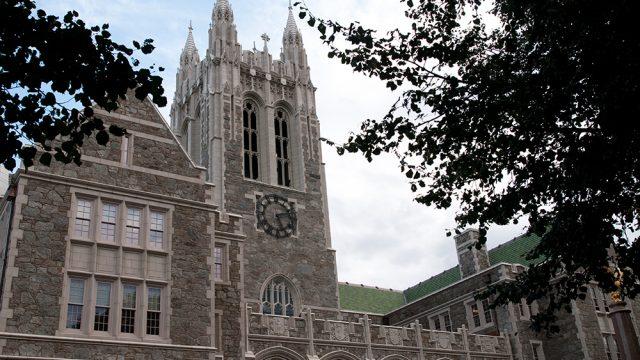
In the wake of the presidential election, we as faculty at Boston College declare our unequivocal opposition to racism, sexism, homophobia, xenophobia, Islamophobia, anti-Semitism, and all forms of identity-based hatred and discrimination on and off this campus. We believe in the power of constructive political dialogue and the imperative to organize and act in strategic, collective ways, but we refuse to engage in dialogue or action that sanctions hate speech or bigotry in any form.
The present political moment calls for an explicit and unambiguous statement of these principles. In the leadup to the election, one candidate, President-elect Trump, ran a campaign designed to pit Americans against one another along the lines of race, religion, ethnicity, and immigrant status. One candidate, President-elect Trump, refused to publicly condemn the hate crimes against Muslims, people of color, and LGBTQ individuals that his campaign emboldened. One candidate, President-elect Trump, failed to unambiguously disavow his boasts about sexually assaulting women. In the wake of the election, President-elect Trump has appointed a chief strategist whose media outlet traffics in racism, misogyny, anti-Semitism, and other toxic forms of bigotry. These and other dangerous failures of leadership at the national level demand that we renew our responsibilities to our students, each other, and the wider world in which we live by affirming and upholding our basic values.
In this spirit, we call on the Boston College administration to immediately adopt a zero-tolerance policy against hate speech. We also call on the administration to take proactive measures to counter the climate of hatred and violence generated by this election and its aftermath. Such measures should include a promise of safety and protection to groups under threat, as well as a statement of empathy for and meaningful solidarity with such individuals and communities. We further call for policies that encourage and support student and faculty action in pursuit of substantive social justice and political transformation. At stake at this historical juncture are not only the rights of women and minoritized groups, but the future of our planet, the welfare of the poor, and many other matters of urgent concern. We believe that actively addressing such issues of fundamental human importance is at the heart of our work as educators, and we call on the Boston College administration to join us in this effort.
Signed,
Faculty for Justice:
Alphabetically,
Allison Adair, English
Treseanne Ainsworth, English
Lillie R. Albert, Lynch School of Education
Shawn Copeland, Theology
Marla De Rosa, English
Charles Derber, Sociology
Nicole Eaton, History
Robin Fleming, History
Dacia Gentilella, English and Learning to Learn Office
Laura E. Hake, Biology
Lori Harrison-Kahan, English
Mary Ann Hinsdale, IHM, Theology and Catholic Studies
Anne Homza, Lynch School of Education
Marjorie Howes, English
Régine Jean-Charles, Romance Languages & Literatures and African & African Diaspora Studies
Marilynn Johnson, History
Tom Kaplan-Maxfield, English
Priya Lal, History
Deborah Levenson, History
Robin Lydenberg, English
Brinton Lykes, Lynch School of Education
Paula Mathieu, English
John McDargh, Theology
Shawn McGuffey, Sociology and African & African Diaspora Studies
Patrick McQuillan, Lynch School of Education
Karen Miller, History
Yajun Mo, History
Sara Moorman, Sociology
Prasannan Parthasarathi, History
Leigh Patel, Lynch School of Education
Stephen Pfohl, Sociology
Deborah Piatelli, Sociology
Patrick Proctor, Lynch School of Education
Virginia Reinburg, History
Sarah Gwyneth Ross, History
Dana Sajdi, History
Juliet Schor, Sociology
Sylvia Sellers-García, History
Kalpana Seshadri, English
Min Hyoung Song, English and Asian American Studies
Eve Spangler, Sociology
Martin Summers, History and African & African Diaspora Studies
Lad Tobin, English
Anjali Vats, Communication and African & African Diaspora Studies
Eric Weiskott, English
Fr. James Weiss, Theology
Ling Zhang, History
Featured Image by Heights Archives